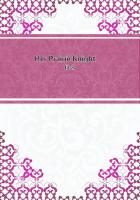"As to my secretaries," added the queen, "not they, but torture spoke by their mouths: and as to the confessions of Babington and his accomplices, there is not much to be made of them; for now that they are dead you can say all that seems good to you; and let who will believe you."
With these words, the queen refused to answer further if she were not given counsel, and, renewing her protestation, she withdrew into her apartment; but, as the chancellor had threatened, the trial was continued despite her absence.
However, M. de Chateauneuf, the French ambassador to London, saw matters too near at hand to be deceived as to their course: accordingly, at the first rumour which came to him of bringing Mary Stuart to trial, he wrote to King Henry III, that he might intervene in the prisoner's favour. Henry III immediately despatched to Queen Elizabeth an embassy extraordinary, of which M. de Bellievre was the chief; and at the same time, having learned that James VI, Mary's son, far from interesting himself in his mother's fate, had replied to the French minister, Courcelles, who spoke to him of her, "I can do nothing; let her drink what she has spilled," he wrote him the following letter, to decide the young prince to second him in the steps he was going to take:
"21st November, 1586.
"COURCELLES, I have received your letter of the 4th October last, in which I have seen the discourse that the King of Scotland has held with you concerning what you have witnessed to him of the good affection I bear him, discourse in which he has given proof of desiring to reciprocate it entirely; but I wish that that letter had informed me also that he was better disposed towards the queen his mother, and that he had the heart and the desire to arrange everything in a way to assist her in the affliction in which she now is, reflecting that the prison where she has been unjustly detained for eighteen years and more has induced her to lend an ear to many things which have been proposed to her for gaining her liberty, a thing which is naturally greatly desired by all men, and more still by those who are born sovereigns and rulers, who bear being kept prisoners thus with less patience. He should also consider that if the Queen of England, my good sister, allows herself to be persuaded by the counsels of those who wish that she should stain herself with Queen Mary's blood, it will be a matter which will bring him to great dishonour, inasmuch as one will judge that he will have refused his mother the good offices that he should render her with the said Queen of England, and which would have perhaps been sufficient to move her, if he would have employed them, as warmly, and as soon as his natural duty commanded him. Moreover, it is to be feared for him, that, his mother dead, his own turn may come, and that one may think of doing as much for him, by some violent means, to make the English succession easier to seize for those who are likely to have it after the said Queen Elizabeth, and not only to defraud the said King of Scotland of the claim he can put forward, but to render doubtful even that which he has to his own crown. I do not know in what condition the affairs of my said sister-in-law will be when you receive this letter; but I will tell you that in every case I wish you to rouse strongly the said King of Scotland, with remonstrances, and everything else which may bear on this subject, to embrace the defence and protection of his said mother, and to express to him, on my part, that as this will be a matter for which he will be greatly praised by all the other kings and sovereign princes, he must be assured that if he fails in it there will be great censure for him, and perhaps notable injury to himself in particular. Furthermore, as to the state of my own affairs, you know that the queen, madam and mother, is about to see very soon the King of Navarre, and to confer with him on the matter of the pacification of the troubles of this kingdom, to which, if he bear as much good affection as I do for my part, I hope that things may come to a good conclusion, and that my subjects will have some respite from the great evils and calamities that the war occasions them: supplicating the Creator, Courcelles, that He may have you in His holy keeping.
"Written at St. Germain-en-Laye, the 21st day of November 1586.(Signed) HENRI, "And below, BRULART."
This letter finally decided James VI to make a kind of demonstration in his mother's favour: he sent Gray, Robert Melville, and Keith to Queen Elizabeth. But although London was nearer Edinburgh than was Paris, the French envoys reached it before the Scotch.
It is true that on reaching Calais, the 27th of November, M. de Bellievre had found a special messenger there to tell him not to lose an instant, from M. de Chateauneuf, who, to provide for every difficulty, had chartered a vessel ready in the harbour. But however great the speed these noble lords wished to make, they were obliged to await the wind's good-will, which did not allow them to put to sea till Friday 28th at midnight; next day also, on reaching Dover at nine o'clock, they were so shaken by sea-sickness that they were forced to stay a whole day in the town to recover, so that it was not till Sunday 30th that M. de Bellievre was able to set out in the coach that M. Chateauneuf sent him by M. de Brancaleon, and take the road to London, accompanied by the gentlemen of his suite, who rode on post-horses; but resting only a few hours on the way to make up for lost time, they at last arrived in London, Sunday the 1st of December at midday. M. de Bellievre immediately sent one of the gentlemen of his suite, named M. de Villiers, to the Queen of England, who was holding her court at Richmond Castle: the decree had been secretly pronounced already six days, and submitted to Parliament, which was to deliberate upon it with closed doors.















